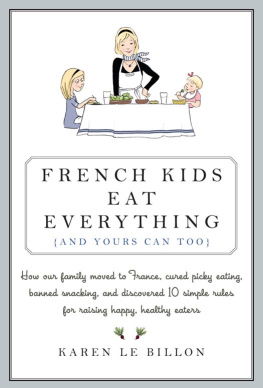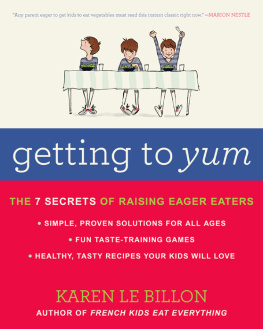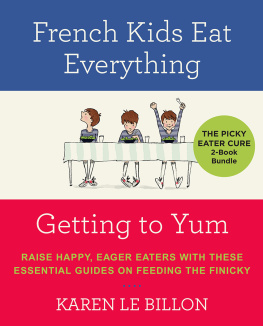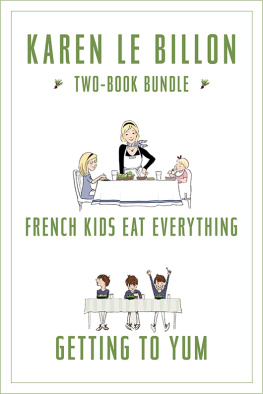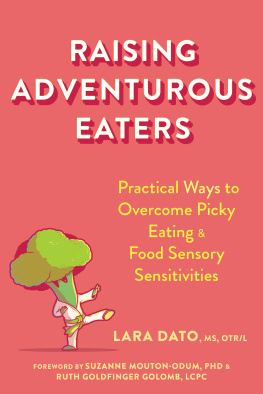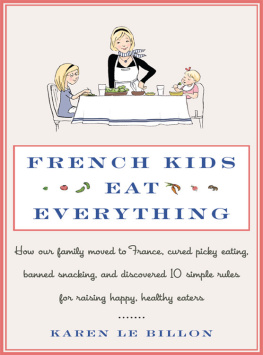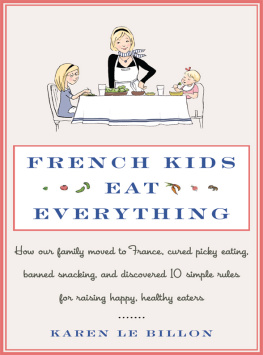
To Philippe
Contents
This book is a very personal story about our family. But it also addresses issues that affect all of our children. Because of poor eating habits, the current generation of North American children will suffer far more health problemsand perhaps have a shorter life expectancythan their parents. We may be training our kids to eat themselves into an early grave.
Its hard to change the way our families eat. Although we know what we should be eatingmore fruits and vegetables and as little processed food as possiblewe dont do it. Or, even if we prepare healthy food, our children often wont eat it. Food insecurity (unaffordability, lack of access) is a serious issue, but even families with adequate resources dont always eat as healthily as they should. So we need to figure out better strategies for how as well as what to feed our kids. This is where the French approach to food education offers valuable lessons. Living in France taught our family that children can eat well and enjoy it too. The healthy eating habits, smart routines, and tasty recipes used by French families and schools were the basis of our familys reinvention of our approach to eating. They inspired us, and my hope is that our story will inspire you too.
But this is not solely a question of parental responsibility or personal behavior. In France, schools, governments, and communities have worked together to create food and education systems that support parents in feeding their children well. In North America, it often seems as if the opposite is true. So we urgently need to have a collective conversation about how to reinvent kids food culturein homes and schools, on farms and in stores via market and governmental reform. My hope is that this story (which is not about haute cuisine, but rather about how ordinary French families are empowered to feed their children well) will inspire you to join in that conversation.
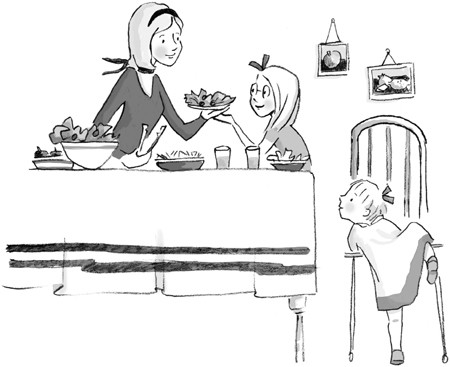
Illustrations by Sarah Jane Wright

Le plaisir de la table est de tous les ges, de toutes les conditions, de tous les pays et de tous les jours.
The pleasures of the table belong to all ages, all conditions, all countries, and to each and every day.
Jean Anthelme Brillat-Savarin, The Physiology of Taste (1826)
Ask my children what their favorite foods are, and the answer might surprise you. Seven-year-old Sophie loves beets and broccoli, leeks and lettuce, mussels and mackerelin addition to the usual suspects, like hot dogs, pizza, and ice cream. Claire, her three-year-old sister, loves olives and red peppers, although her all-time favorite is creamed spinach. Living as we do in Vancouver, where the worlds largest salmon-spawning river flows through one of the continents largest Chinatowns, our daughters also happen to love seaweed, smoked salmon and avocado sushi.
Our daughters enthusiastic eating habits are no surprise to my French husband, Philippe. But they still surprise me, because food fights used to be frequent at our house. Before our family moved to France and embarked on our (unintended) experiment with French food education, dinnertime was parenting purgatory. Fries were my daughters favorite vegetable. Anything green was met with clenched teeth. Whining stopped only when dessert appeared. Our daughters subsisted on the carbohydrate and dairy-rich diet that is the mainstay of North American families. Our standbys were Cheerios, pasta, and buttered toast. We considered goldfish crackers to be a separate food group.
Sophie was a picky eater right from the start. By the time she was three, she had developed a fear of new foods that reminded me a lot of myself as a child. Anything objectionable on her plate would trigger her little crazy food dance (as we called it): arms waving, eyes rolling, Sophie would whine, sometimes yell, and even jump up from the table to avoid being confronted with the fearsome food in question. Her somewhat quirky tastes didnt make it easy to avoid setting off this behavior. For example, Sophie didnt like vegetables, or anything white or creamy: cheese, yogurt, any sauce of any description, or even ice cream. And she refused to eat things that most other children like, including macaroni and cheese, and sandwiches of any kind.
In contrast, Claireher younger sisterwas our little Buddha baby, calm and contented. Youve won the lottery, our midwife told us on the day she was born. While Sophie specialized in twenty-minute naps (but only while being walked in the stroller or snuggled in the baby carrier), Claire would enjoy lazy two-hour siestas and still sleep for a blissful ten hours at night. And she ate almost anything. That is, she would eat almost anything until she started behaving like her older sister. This gave me a serious case of parental performance anxiety, combined with a good measure of guilt.
You see, my husbands friends, parents, aunts, uncles, cousins, and other sundry and assorted relatives all expected our daughters to eat like French children. And French kids eat everything, from fruit salad to foie gras, spinach to stinky blue cheese. They eat things most North American kids (and some of their parents) would never dream of eating, like cardoons. (Dont worry, Id never heard of them either.) They also regularly consume things that most of us wish our kids would eat, like salad. I have seen my French nieces and nephews greeting radishes with as much delight as popcorn. I have witnessed three-year-olds devouring seafood of all sorts and toothless babies sipping everything from bchamel sauce to vegetable bouillon. Some have even more exotic preferences: Didier, who would cheerfully savor la langue de boeuf (beef tongue), or little Fabrice, whose favorite food was museau la vinaigrette (pickled pig snout), or baby Claire, who gummed her daily ration of Roquefort cheese with obvious delight.
Now, French kids dont eat this way because of some genetic predisposition for liking exotic foods. Just like kids anywhere, their favorites include things like pasta, potato chips, chicken, and chocolate. But thats not what they usually eat. As amazing as it may sound, French children love all kinds of food, and most of what they eat is healthy. True, you might find the rare French child who has an aversion to specific foods (cauliflower, in my husbands case). But, for the most part, French kids consume anything put in front of them. They eat in a straightforward, joyous, and all-embracing way that seems baffling to the ordinary North American. And everyone assumes this is normalincluding the kids.
This is, in fact, a junior version of the famous French Paradox, which has had scientists scratching their heads for years. In a nutshell: French adults spend twice as much time as Americans eating, and they consume foods like butter, pork, and cheese in apparently uninhibited quantities, yet are less overweight (and very rarely obese) and have lower rates of heart disease than Americans. Yes, this is one of those unfair facts of life: the French, it seems, can truly have their cake and eat it too.
The way French kids eat is equally paradoxical. French parents gently compel their children to eat healthy food. They expect their kids to eat everything they are served, uncomplainingly. They ask them to spend long hours at the table (where they are expected to be extremely well behaved) rather than watching TV or playing video games. Despite this, French kids think eating is fun. And thats not all: Frances rate of child obesity is one of the lowest in the developed world. And while rates of overweight and obese children are at an all-time high and are rapidly increasing in most wealthy countries (with the United States leading the pack), they are stable and even declining in France. This is not because theyre all on a weight-loss program; diets for French children are relatively rare because few of them need it.
Next page
